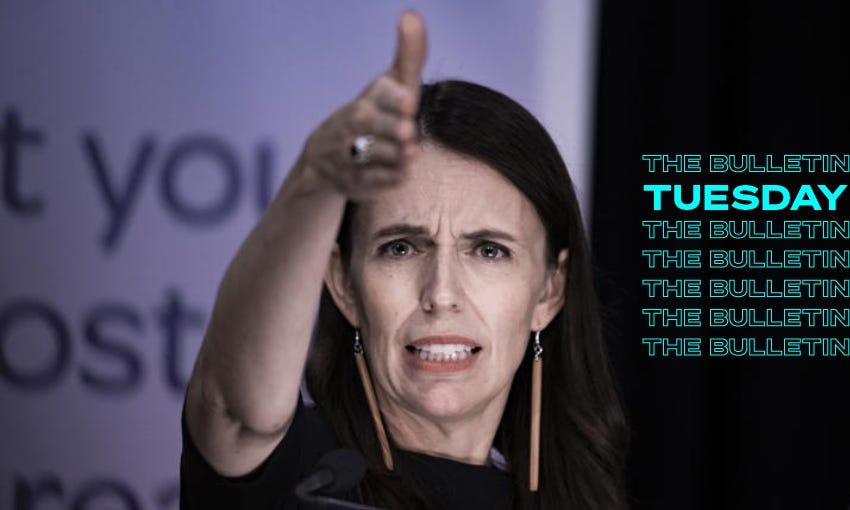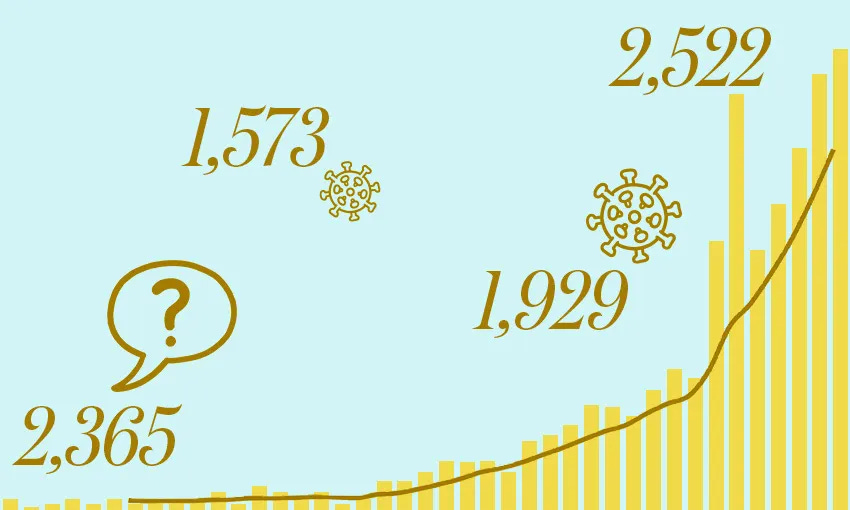Covid restrictions to ease after omicron peak
NZ faces a tough six weeks, but some vaccine mandates could end before winter
Mōrena and welcome to The Bulletin for Tuesday, February 22, by Justin Giovannetti. Presented in partnership with Z Energy.
In today’s edition: Hospitals at capacity; businesses get new Covid supports; two students expelled after racist attack; but first, the roadmap out of omicron.
Covid restrictions could be eased in the coming months. (Image: Robert Kitchin / Pool)
Some vaccine mandates will begin to lift after omicron peaks, but it could take some time. “It’s likely that very soon we will all know people who have Covid or we will get it ourselves,” Jacinda Ardern said yesterday as she unveiled a future with fewer pandemic restrictions. “There was a time when that was a scary prospect, but it doesn’t have to be now.” As The Spinoff’s live updates reports, the prime minister warned that the next six weeks will be difficult, with cases likely hitting a peak in late March. After that, case numbers are expected to fall rapidly. It isn’t clear when, but after the peak, when the hospital system is managing and enough beds are free, the country will start moving back down the traffic light system. The use of vaccine passes will be scaled back at that time and vaccine mandates for many workers will be removed.
Mandates are the ‘least bad option’ and they work: Ardern. Some workers facing vulnerable populations, especially those in health and possibly in education, could continue to face mandates through the pandemic. However for everyone else, mandates were always meant to be temporary, Ardern said. As Stuff reports, the prime minister directed her words to the protesters outside parliament to tell them she wasn’t backing down with the announcement. “Everyone is over Covid, no one wants to live with rules and restrictions, but if we hadn't done what we did, we would have more Covid and lost people we love,” she said.
A full reopening could still wait until after winter. In response to a question about returning to the green level after omicron peaks, Ardern said that’s the goal, but warned there needs to be great care about when to move out of red. “The ministry of health do want us to be cautious as we hit winter,” said Ardern. There’s three reason for that caution: the border will reopen to all New Zealanders; the flu is likely to hit hard after two years without; and future waves of omicron could spread, especially as people spend more time inside. Each of the three could mean a significant rise in cases. If the hospital system finds itself with few spare beds in late April or early May, it’s possible a further reopening could wait as cold weather rolls in.
National warns of a ‘society divided’ by Labour’s Covid rules. Christopher Luxon said the prime minister was “missing in action” during a speech yesterday where he tried to stake out a middle ground between Labour and an Act party calling for a more immediate rollback of Covid rules. While the prime minister said she wouldn’t scale back restrictions as the country faces its most serious Covid threat, the National leader countered that she could remove mandates on border workers and children. On the latter point, the government has already said rules impacting children aren’t coming out of the Beehive. The NZ Herald’s Audrey Young (paywalled) said Luxon’s speech “reeks of opportunism” and was a serious misstep for the new leader. Luxon was trying to use the protest as a rhetorical device to attack the government. He wanted to place himself as a third option for a public that might need to choose between an illegal occupation and the prime minister. According to Young, he didn’t pick his targets well and it’s probably time for the opposition to rethink its approach.
The Spinoff’s Covid data tracker has the latest figures.
Just quickly, if you're enjoying The Bulletin and value what we do, please consider joining The Spinoff Members. Our members exclusively fund our journalism and we wouldn't be here today without their support. Donate now.
Is your business keen to support us? Ask us about our organisation memberships.
Patients waiting in corridors as hospitals struggle at capacity. RNZ reports that patients are waiting up to 36 hours in emergency departments, often in corridors, as hospitals hit crisis levels. Hospitalisations from Covid are at record levels, but that only represents 116 cases and one in ICU. Instead, doctors said there’s just not enough capacity for regular care and a shortage of nurses is making it difficult to open spaces in wards. Managing hospitalisation levels will be critical in the coming weeks as omicron is expected to cause a surge in cases needing care.
Businesses will get a new lifeline from government to survive omicron. The finance minister rolled out a support package yesterday that could pay businesses hit by Covid-19 up to $84,000 over the next six weeks, according to Interest. The new programme is expected to cost the Treasury from $480 million to $780 million. Businesses have received $22 billion from taxpayers since the start of the pandemic and the government added another $5 billion to its Covid fund yesterday to pay for future expenses from omicron.
New to The Spinoff? Need more of The Spinoff in your life? The best way to stay in touch with what we do is by downloading our app (for iPhone or Android) and by subscribing to one or more of our other newsletters. Are podcasts and videos more what you’re into? You’re in luck. We have podcasts covering everything from reality TV to politics and business. And we have a selection of smart, entertaining documentaries and factual series with both experienced and emerging film-makers. You can find these on our homepage. And, of course, don’t forget to follow us on Facebook, Instagram and Twitter.
Two students expelled from Otago Girls’ High School after Islamophobic assault. The school’s board and principal have refused to publicly comment on any measures taken after a student’s hijab was pulled off and she was beaten. The board’s chair has hung up on reporters calling to asking questions. However, Stuff reports that two of the three students involved in the assault have been expelled. According to RNZ, an international campaign is calling on the school to do better and formally apologise to the victim. The Muslim community in Dunedin has also said it warned of Islamophobia at the school before the attack. The school’s ongoing silence means there’s no public understanding of whether deeper issues of racism within its halls have been dealt with. I asked the prime minister yesterday whether the government needs to involve itself in the situation after the school won’t publicly comment and ensure all students are safe. Jacinda Ardern said she thought the school had spoken publicly and ignored the question. It’s been a disappointing response by both the prime minister and the school.
The worrying situation in Ukraine. Last week The Bulletin looked at growing tensions between Russia and the former member state of the Soviet Union. While war hasn’t broken out yet, the situation has grown more concerning. Despite promises it was removing troops, Russia has instead moved its large military presence closer to its border with Ukraine. Meanwhile, Russian-aligned separatists within Ukraine have been shelling civilians and mass cyberattacks have targeted Ukraine’s political and economic infrastructure. Suspicious car bombs have also gone off near Russian installations that have injured no one, but have given the Russians plenty of context to claim they are facing attack. With the threat of war likelier than ever, Reuters reports that the Russian and American presidents are now expected to meet at a summit to lower tensions.
In a moment of international humour: Turkey’s new name. It’ll be Türkiye going forward as The Week details Turkey’s decision to change the name foreigners use to describe the country, dumping its anglicised moniker after a century. While the official reason for the rebrand was a better reflection of culture and civilisation, its been widely reported that Turkey’s famously thin-skinned president Recep Tayyip Erdoğan was tired of his country sharing its name with the Thanksgiving bird. One of them had to change and the bird won.
It's called On Site and it's made by The Spinoff Podcast Network in partnership with Trade Jobs NZ. Over the coming weeks hosts Jay Reeve and Brooke Thompson will be talking to everyone from apprentices to industry leaders about life in the trades and how they’d like to see the sector evolve in the future. In the first episode, out today, Brooke talks about her journey to the trades, where it's taken her so far and why she's so excited about the future.
Listen to it on our site on Apple Podcasts, Spotify or your favourite podcast provider.
Got some feedback about The Bulletin, or anything in the news?
Get in touch with me at thebulletin@thespinoff.co.nz
Right now on The Spinoff: Siouxsie Wiles writes about what key numbers we should watch as the omicron outbreak grows. Chris Schulz speaks with supermarket staff who describe the scary experience of serving protesters. Matthew McAuley (partnership content) looks at whether earlier dementia detection could save lives. Dominic O'Sullivan explains the balancing act between police independence and accountability. Tuiloma Gayle Lafaiali’i says it’s never too late to learn your mother tongue.
Football Ferns rally around Meikayla Moore after three own goals. The New Zealander is at the centre of international news for all the wrong reasons after she accidentally scored on her own team three times in a 5-0 defeat to the US. As Stuff reports, her coach gave Moore a big hug and said she’d had a bad game. It happens to all of us.







